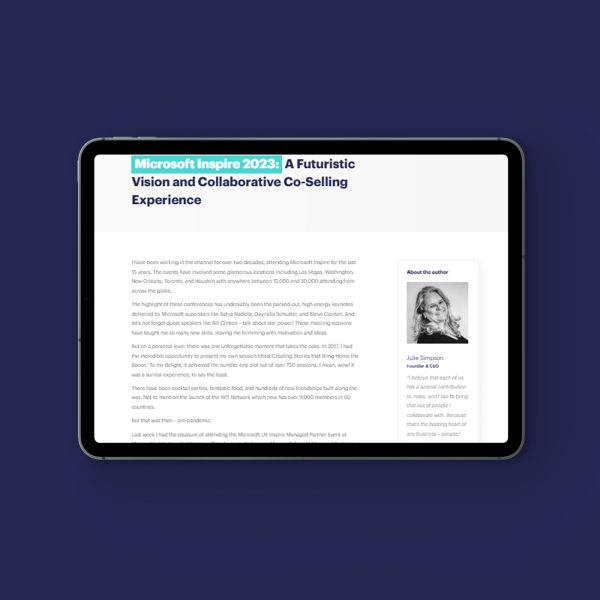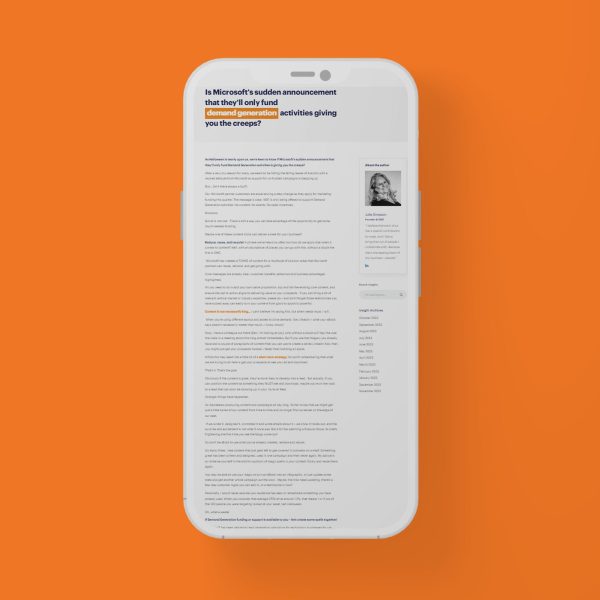Whatever your business or industry, incorporating digital marketing practices into your strategy is critical if you’re to stand out from the crowd.
Failure to utilise the wide range of benefits digital marketing provides could see your company left behind. Yet with numerous platforms, constant innovation and various types of digital marketing available to you, we realise it can often be a confusing concept to get to grips with.
But that’s where we come in! Our digital marketing gurus have put their heads together to create your Ultimate Guide to Digital Marketing, containing all the information you need to know to get the most out of your digital efforts.
Let’s start with the basics…
What is Digital Marketing?
In its simplest description, digital marketing is basically online advertising.
The Digital Marketing Institute defines the term as “the use of digital channels to promote or market products and services to targeted consumers and businesses”.
It’s a general term which refers to techniques including social media marketing, email marketing, SEO, PPC, and more – but don’t worry, we’ll get to those shortly!
Digital marketing varies from the more traditional marketing methods, such as print adverts, billboards, radio and tv; however, the lines between the two are blurring, with digital elements being incorporated into almost every channel today.
Digital marketing is suitable for everyone, including B2B and B2C companies. Whether you’re looking to increase your number of leads, boost your sales figures, or raise your brand awareness, digital marketing is most definitely the way forward.
B2B Digital Marketing
If you’re a B2B company, it’s highly likely that your online marketing will be centred around generating leads rather than direct sales. To achieve this, your digital marketing strategy should be designed to firstly attract, and secondly convert, high-quality leads that you can direct to your sales team.
Did you know that B2B brands who blog generate 67% more leads on average than brands that don’t? – Hubspot.
Sticking to business-focused channels, such as LinkedIn, has always been the most effective for B2B companies as you’re getting your voice heard by your target demographic. Although recent studies have suggested that the lines between B2B and B2C are blurring!
Want to learn more? Read our article: Why B2B Digital Marketing Strategies Are More Important Than Ever.
Digital Marketing for B2C Companies
In comparison to B2B strategies, digital marketing for B2C companies usually centres around driving website traffic and increasing sales, without the need for communication with a sales team. B2C companies are able to target their customers much higher up the sales funnel than B2B enterprises can, which means you can feature your product in content much earlier and use stronger calls to action.
B2C marketing channels are much more diverse than those used by B2B companies and utilising all relevant social media platforms, including Instagram and Pinterest, has proved incredibly effective for many B2Cs in all industries.
Why is Digital Marketing important?
The answer to this question will likely change depending on who you ask, but that’s the beauty of digital marketing – its capabilities are endless and can be tailored specifically to suit the needs of your business.
Regardless of your goals, digital marketing is essential for all businesses looking to achieve growth and success in today’s markets.
With over 59% of the world’s population online, businesses that don’t have a digital marketing strategy in place just cannot expect to compete with those that do.
To put it simply, digital marketing helps you to reach a much wider audience than you ever could achieve using only traditional advertising methods. Plus, as it’s often much more cost-effective than traditional methods, digital marketing helps to level the playing field between you and your competitors.
Thanks to digital marketing, smaller companies can now compete with the big brands and reach target audiences they struggled to reach in the past.
Developing a carefully planned, multi-channel, digital marketing strategy will help you to achieve a wide range of goals. You can increase your brand awareness and credibility by providing value using various forms of content, boost your customer loyalty with regular communications, support your customers throughout their unique buying journey, and much much more.
Types of Digital Marketing
Digital marketing is an umbrella term that refers to an extensive range of different marketing types, all of which use different channels, platforms, techniques and formats. Feeling overwhelmed? We’re not surprised! It can be a lot to get your head around, so let’s get into it and break down the different types of digital marketing.
LinkedIn Marketing
Since its inception in 2003, the business-focused social media platform LinkedIn has been helping businesses and individuals to form connections across their respective industries organically. And while it’s great for making connections, it’s also another platform businesses can utilise to promote their products and services in alternative ways.
Thanks to its business-focused approach and lead-generating abilities, LinkedIn marketing is particularly beneficial for B2B companies.
LinkedIn Marketing is all about demonstrating your value; sharing content that demonstrates your knowledge and expertise in your industry. This then leads to new connections, partnerships, an increase in brand awareness, website traffic, and therefore leads.
Recent studies found that LinkedIn is the best social media platform around when it comes to generating leads, with LinkedIn marketing generating leads 227% more effectively than Twitter and Facebook!
Content Marketing
Content marketing (also referred to as content creation) is a rather broad term used to refer to the method of creating and sharing valuable and relevant content across your digital channels. Utilising a combination of written and visual content is a great way to attract potential customers and increase brand awareness.
When you create high-value content, members of your audience are much more likely to enjoy and appreciate it, and depending on the extent of this, they may re-share it with their own audiences. Not only does this help to increase your brand awareness to new audiences, but it also demonstrates your authority and abilities in your specific industry, enabling you to position yourself as experts in that field.
The types of content you produce will be influenced by the type of business you are in and the industry you work in. Some common content types include:
Pay-Per-Click Marketing
Pay-per-click, also known as PPC, is exactly what it says on the tin. Most commonly associated with search engines and Google Ads, PPC is a type of advertising that involves paying a fee to display your website at the top of the SERP (Search Engine Results Page). The ads you create will be displayed when your target keyword or phrase is searched, and you will only be charged when people click on the ad.
As well as search engines, PPC can also be used on various social media platforms to get your ads in front of the right people at the right time. If set up correctly, with ads that take potential customers to locations where they can convert, PPC can provide you with high-quality leads and increase your sales massively, thereby resulting in a great ROI for your ad spend.
Organic Social
In comparison to PPC, organic social marketing involves posting free content to your social media channels, including Facebook, Instagram, Twitter, Pinterest, and more.
Recent studies found that over 65 million businesses currently have active Facebook pages, and an estimated 84% of brands are using social media as part of their digital marketing strategies.
Compared to other types of digital marketing, organic social may not necessarily be the best way to increase sales. However, it is one of the best methods for establishing a real connection with your target audience – and it’s completely free!
A successful and consistent organic social approach is the best method for ensuring you’re always at the forefront of your customer’s minds. Sharing great content with your audience means that even though they may not be ready to purchase at that exact moment, you can be sure that you’re the first brand that comes to mind whenever they are ready to convert.
When you utilise the social media channels your customers are using you can accomplish a number of things. Firstly, you can better establish your brand’s personality, build lasting relationships and brand loyalty, as well as supporting customers with their customer service needs, and engaging your target audience at various points in their journey.
Email Marketing
An incredibly popular type of digital marketing, email marketing is exactly what it sounds like: the use of email as a channel to promote products and services, as well as create and nurture relationships with existing and potential customers.
Did you know that personalising your emails can boost resulting conversions by roughly 10%?
Email marketing is a particularly cost-effective method of digital marketing as you can automate emails to target and re-target your audience at various points of their customer journey – keeping them in the sales funnel and nudging them towards converting.
The ability to segment audiences and re-target prospective clients is a huge benefit of email marketing that can dramatically increase your leads and sales when done correctly.
SEO
A term you’ve definitely heard thrown about in digital marketing conversations, SEO stands for Search Engine Optimisation. In a nutshell, SEO refers to a range of practices designed to increase your ranking and appearance in SERPs. Think about it like this, when was the last time you Googled something and went to Page 5 of the results to find your answer?
That’s right, never!
Conducting keyword research, writing your site copy with SEO in mind, and aligning your content with what Google is returning for specific terms are just some of the practices you can use to increase your organic ranking and get seen on Page 1. The higher your organic position, the more impressions, clicks, and therefore leads you will receive.
Benefits of Digital Marketing
Yes, traditional marketing tactics are still successful, but dismissing digital marketing in today’s world is a big mistake. Still not convinced? Let’s take a look at the huge range of benefits that an effective digital marketing strategy will provide you…
-
It's hugely cost-effective, providing a great ROI and giving you complete control over your spend
-
It's entirely measurable with accurate tracking so you know exactly what is or isn't working and can make optimisation to each campaign, increasing your campaign effectiveness
-
It allows you to reach your audience at all stages of their journey
-
You can customise your strategy at all times to make it as successful as possible
-
You can create a multi-channel approach, choosing the most appropriate formats for your business, to maximise your impact
-
It allows you to tailor campaigns to specific audiences depending on a range of factors, including age, location, interests, hobbies, device type, online activity and purchases, etc.
-
You can retarget audience members who have shown an interest in your brand or a specific campaign, thereby increasing your conversion rate
Approaching your Digital Marketing Campaign
Convinced your company would benefit from digital marketing? Great – you’ve taken the first step! Unfortunately, knowing where to start can often feel incredibly daunting.
Good news though – our expert team has helped hundreds of companies branch out into the world of digital marketing, so to help you get the ball rolling we’ve created a brief plan explaining how you can approach your digital marketing campaign:
- Set specific goals – Ideally, the clearer and more specific your goals are, the more likely you are to achieve them! Setting SMART goals (Specific, Measurable, Attainable, Relevant, and Timely) means you know exactly what you want to achieve and how you can achieve this. Maybe you want to gain 200 followers on LinkedIn in 6 months, or you’re looking to generate 25 new leads in 12 months, etc. Whatever it is, break it down as much as possible before you get the rest of your strategy in place.
- Define which channels you will use – Determining which platforms are most appropriate for your business to market on depends entirely on your target audience; what platforms are they using? What is the best method you can use to reach them and get your message across? For a digital marketing campaign to be successful, you don’t have to use every single platform!
- Set a clear budget – Your digital marketing budget will be unique and specific to your strategy; the more complex strategies that involve multiple channels will inevitably cost more due to the time, effort and resources required to run and manage them. There are a number of factors involved in setting your digital marketing budget that you’ll need to consider. What resources do you have in your digital toolkit? Do you need to invest in new software? Will you be running paid ads? Will you entrust your tasks with freelancers or would you rather provide existing team members with Marketing Training? How competitive is your industry? Fortunately, when it comes to digital marketing there are lots of free platforms and tools out there to help you keep costs down where possible!
Once you’ve got all this information in place, it’s time to develop your strategy! Then you’re into the next stages of launching and monitoring said strategy, implementing improvements and adjustments where necessary and tracking your ROI.
Digital Marketing Trends in 2023
Due to the nature of the internet, the world of digital marketing is ever-evolving. Using upcoming trend predictions to your advantage can be hugely beneficial and help to keep your company ahead of the curve, so what sort of trends can we expect to see in 2023?
The prevalence of digital marketing agencies
As digital marketing continues to show its value and importance, more and more companies are passing their digital marketing over to an expert agency. This shift makes sense and frankly has been coming for a long time. Years ago, posting the odd blog every now and then might have been sufficient but with more and more companies creating their own digital marketing strategies, the market has become much more competitive.
Delegating your digital marketing to an agency means you save time and effort and your staff can focus on the tasks they were hired for. As a result, you leave matters in the hands of a team with the expertise needed to produce results. For small businesses and start-ups, this could be the difference between making a little progress over the first year to making big moves in their industry!
Finding an agency or channel partner with experience in your specific industry can have the biggest impact. For example, we’ve helped to provide hundreds of businesses in the IT and Technology sectors with successful digital marketing strategies, giving them a competitive advantage over their closest competition.
Got a minute? Discover how we helped Claranet to achieve their goals and significantly increase impressions and leads!
Chatbots are on the rise
Audiences today are used to getting the answers they need in an instant. People are shifting away from traditional phone calls and emails to using live chats on your website. Because of this shift, marketers are also seeing the increased value of chatbots; they’re another format you can use to acquire customer information.
They’re becoming more and more widely available meaning they’re achievable by businesses of all sizes. Plus, they’re also becoming more advanced – allowing you to tailor your bot to fulfil your customer’s requirements and provide them with a personalised experience.
Additionally, and most importantly, they can be used to provide customer assistance outside of your working hours so you never have to miss out on a lead again! It’s estimated that chatbots can now handle upwards of 68.9% of chats from start to finish, meaning you can save time and money automating customer service processes.
Additionally, and most importantly, they can be used to provide customer assistance outside of your working hours so you never have to miss out on a lead again! It’s estimated that chatbots can now handle upwards of 68.9% of chats from start to finish, meaning you can save time and money automating customer service processes.
Creativity is key
Audiences are faced with digital marketing everywhere they look, so it’s no wonder they’ve become bored of the same old thing over and over. A push on creativity by trying new tactics and approaches will only lead to success in the long run. Plus, with original ideas and strategies, you’ll stand out against your competitors with ease! Valuable, fresh and insightful content is much more likely to be shared by your customers, resulting in free brand awareness for you.
Influencers – love them or hate them, they’re here to stay
Back in the mid-2010s, influencer marketing was a relatively new and rather scary concept, but flash forward to today and everybody’s benefitting from it!
Influencer content and UGC (User Generated Content) are seen as more trustworthy than many other content types. It’s no wonder that influencer marketing worldwide is said to be worth an estimated $16.4 billion (USD) today, and it’s only growing.
The value of the global influencer marketing market has more than doubled between 2019 and 2022, as businesses are shifting their ad budgets and marketing spends to influencer marketing techniques. A recent study found that 11% of B2C marketing experts had considered making influencer partnerships their primary marketing channel.
Email marketing isn’t going anywhere
With 89% of marketers relying on their email marketing to generate leads, it’s definitely a trend that will continue throughout 2023. It’s a great way to reach as many people as possible – everyone has an email address, but not everyone uses social media platforms, for example.
Moving into 2023, we expect to see a push on more creative, and personalised emails with customer journeys tailored to meet your user’s needs.
If you’re not already, why not try incorporating some of these expected trends into your digital marketing strategy to stay ahead of the curve?
Need a hand with your digital marketing?
Here at ResourceiT, we’ve helped hundreds of IT & Tech businesses to develop and implement successful digital marketing strategies. So, whether you’re a reseller, vendor, or distributor, our experienced team is here to help with all your digital marketing needs!
Curious? Get in touch with us today to see how we can help you!




